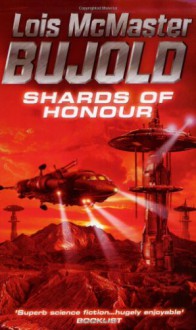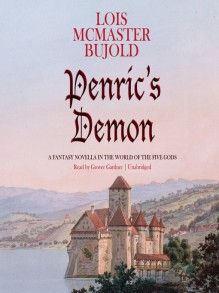
Shards Of Honour" is Science Fiction at its best, using the conflict between two cultures and the attraction between two strong, independent, action-oriented leaders both to tell an exciting tale and to spark insights into the nature of power, honour, personal courage, leadership and personal and institutional evil.
"Shards Of Honour" doesn't have a particularly strong plot. The story is linear and mostly unsurprising. On the surface, this seems to be a love-on-the-battlefield meets culture clash between a hierarchical male-dominated militaristic culture and a less obviously hierarchical, more sexually egalitarian, science and commerce based culture. If it had been a "Star Trek" episode it would have been cheesy but fun.
Two things lift "Shards of Honour" beyond level of cheesy romantic space romp and make it into science fiction that continues to be relevant and challenging.
The first is that the two characters at the heart of the story are richly drawn. They both decline to be what others expect them to be. They both struggle to define and do the honourable thing. They both succeed in being both lionised and rejected by their home cultures and neither of them defaults to the simplest understanding of a individuals or the circumstances that drive their behaviour.
Cordelia Naismith is calm, courageous, resourceful, leans heavily on humour to keep threats at a manageable distance and driven almost entirely by have values and her curiosity.
Aral Vorkosigan is a born strategist, prone to both anger and violence but who seeks to control both in the name of honour. He serves loyally but not uncritically and he leads because he cannot help it.
The second is the depth of political and moral thought in the novel. "Shards Of Honour" was published in 1986 but the political commentary is perhaps even more relevant now than it was in those, in retrospect, optimistic times.
The need for personal honour is shown by its lack in a sadistic senior officer who uses his power over women prisoners to break them for his pleasure using rape and torture. After an up close and very personal encounter with this man, our Cordelia describes him as "the ultimate in evil".
I agreed with her but Aral, the strategist, the man who commands fleets of warships sees a greater evil. He describes the sadistic rapist as:
"...just a little villain. An old-fashioned craftsman making crimes one-off. The really unforgivable acts are committed by calm men in beautiful green-silk rooms who deal death wholesale, by the shipload, without lust or anger or desire or any redeeming emotion to excuse them but cold fear of some pretended future. But the crime they hope to prevent in that future are imaginary. The ones they commit in the present, they are real."
In this time of Brexit, we need reminders that the now is real and the future just an imagined thins we ask others to sacrifice themselves to protect.
In this time of Trump, this quote resonated with me:
"A Caligula or a Yuri Vorbarra can rule a long time while the best men hesitate to do what is necessary to stop him and the worst ones take advantage."
In another lesson that seems more relevant than ever today, we are shown how we create false but appealing narratives to feed our own desires. At one point, her own people hail Cordelia as a hero and attribute actions and attributes to her that she knows to be false. I was fascinated by the explanation of Cordelia's inability to get the truth across. Again it, seems relevant to today's politics. Cordelia, being carried on the shoulders of an excited crowd says:
"It's not true. Stop this."
It was like trying to turn back the tide with a teacup. The story had too much innate appeal to the battered prisoners, too much wish-fulfilment come to life. They took it in like balm for their wounded spirits and made it their own vicarious revenge. The story was passed around elaborated, built up, sea changed, until within twenty-four hours it was as rich and unkillable as legend. After a few days, she gave up trying. The truth was too complicated and ambiguous to appeal to them..."
To my mild embarrassment, as someone who has been an avid reader of Science fiction for nearly fifty years, I failed to notice Lois McMaster Bujold until 2017 when a number of people recommended her to me and her "Vorkosigan Saga" won a Hugo for Best Series.
I bought "Shards of Honour", the first book in the series, and then let it sit on my TBR pile for seventeen months. I've only picked up now because I set myself a"Thirty Firsts TBR Challenge". Now that I've finally read it, I'm kicking myself for my inattention.
Lois McMaster Bujold is now on my "read everything she's ever written" list. I'll start with the rest of the Vorkosigan Saga and go from there.


 Log in with Facebook
Log in with Facebook 









